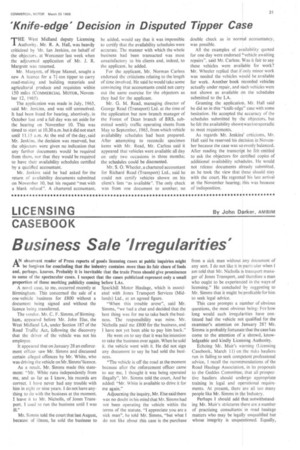'Knife-edge' Decision in Disputed Tipper Case
Page 33

If you've noticed an error in this article please click here to report it so we can fix it.
rr HE West Midland deputy Licensing Authority, Mr. R. A. Hall, was heavily criticized by Mr. Ian Jenkins, on behalf of the objectors, at Worcester last week when the adjourned application of Mr. J. R. Margrett was resumed.
Mr. Margrett, of Hope Mansel, sought a new A licence for a 71-ton tipper to carry road-making and building materials and agricultural produce and requisites within 150 miles (COMMERCIAL MOTOR, November 12, 1965).
The application was made in July, 1965, said Mr. Jenkins. and was still unresolved. It had been listed for hearing, abortively, in October last and a full day was set aside for the hearing on November 10. This was timed to start at 10.30 a.m. but it did not start until 11.15 a.m. At the end of the day, said Mr. Jenkins. the decision was reserved, but the objectors were given no indication that any further documents would be required from them, nor that they would be required to have their availability schedules certified by a qualified accountant.
Mr. Jenkins said he had asked for the return of availability documents submitted on November 10, but his request "met with a blank refusal". A chartered accountant, he added, would say that it was impossible to certify that the availability schedules were accurate. The manner with which the whole business had been transacted was most unsatisfactory to his clients and, indeed, to the applicant, he added.
For the applicant, Mr. Norman Carless endorsed the criticisms relating to the length of time involved_ He said he would take some convincing that accountants could not carry out the same exercise for the objectors as they had for the applicant.
Mr. G. M. Read, managing director of George Read (Transport) Ltd. at the time of the application but now branch manager of the Forest of Dean branch of BRS, submitted weekly traffic operating sheets from May to September, 1965, from which vehicle availability schedules had been prepared. After attempting to reconcile specimen items with Mr. Read, Mr. Carless said it appeared that vehicles were available all day on only two occasions in three months; the schedules could be discounted.
Mr. S. 0. Wheeler, a chartered accountant for Richard Read (Transport) Ltd., said he could not certify vehicles shown on his client's lists "as available". The only check was from one document to another; no double check as in normal accountancy, was possible. All the examples of availability quoted for one day were endorsed "vehicle awaiting repairs". said Mr. Carless. Was it fair to say these vehicles were available for work? Mr. Wheeler replied that if only minor work was needed the vehicles would be available for work. Another book recorded vehicles actually under repair, and such vehicles were not shown as available on the schedules submitted to the LA.
Granting the application, Mr. Hall said he did so in this "knife-edge" case with some hesitation. He accepted the accuracy of the schedules submitted by the objectors, but he felt the availability shown was too sporadic to meet requirements.
As regards Mr. Jenkins' criticisms, Mr. Hall said he reserved his decision in November because the case was so evenly balanced. After reading the transcript he felt entitled to ask the objectors for certified copies of additional availability schedules. He would not release documents already submitted, as he took the view that these should stay with the court. He regretted his late arrival at the November hearing; this was because of indisposition.




















































































































